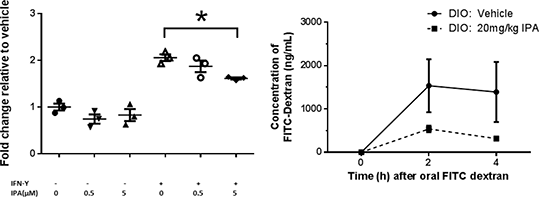Print version
Search Pub Med
| 234P London, UK Pharmacology 2016 |
Beneficial effects of bacterially-derived tryptophan metabolite indole-3-propionic acid in vitro and in vivo and its association with obese/T2D patients undergoing bariatric surgery
Introduction: The intestine and microbiome contribute to metabolic diseases (Type 2 diabetes, T2D, and obesity). This is in part due to increased inflammation1 and intestinal permeability2 resulting in metabolic endotoxemia that is associated with insulin resistance. Roux en Y Gastric Bypass surgery (RYGB) is efficacious by multiple mechanisms, including the composition of gut microbiome. Recent data from global metabolomics in obese and T2D patients showed reduced levels of bacterially-derived tryptophan metabolites, including indole-3-propionic acid (IPA), compared to lean non-diabetics3. IPA modulates intestinal inflammation4, but its role in metabolic disease is unknown. Therefore, IPA was evaluated for effects on intestinal permeability in vitro and in Diet-Induced Obese (DIO) mice, as well as the plasma levels in patients before and after RYGB surgery.
Methods: Human intestinal epithelial T84 cell monolayers were cultured in transwells in the presence of pro-inflammatory cytokines (IFN-γ; 5ng/ml) or vehicle (24 h) as well as IPA (4 h). Apical addition of FITC-dextran (4kDa,1mg/ml) assessed paracellular permeability. DIO C57BL6 mice (19 wk high fat diet) were orally gavaged dailywith vehicle (PBS) or IPA (20mg/kg for 4 days) and intestinal permeability was assessed after oral FITC-dextran.
Results: IPA had little effect on monolayer permeability (vehicle), but ameliorated the enhanced permeability induced by IFNγ (left; *p<0.05) and in DIO mice (right). In obese diabetic patients (n = 9) plasma IPA is reduced relative to lean (n = 7) and the reduced levels are reversed by 3 months post-surgery.
Conclusion: A bacterially-derived tryptophan metabolite, IPA, is reduced in patients and increased after RYGB surgery. IPA reduces intestinal permeability in vitro, and in DIO mice therefore it mayin part benefit patients through improved intestinal barrier function in the context of metabolic endotoxemia.
1. Osborn O et al. (2012). Nat Med 18:363-374. 2. Cani P et al. (2008). Diabetes 57:1470-1481. 3. Sarosiek K et al. (2016) J Diabetes Res; http://dx.doi.org/10.1155/2016/3467403. 4. Venkatesh M et al. (2014) Immunity 41:296-310


